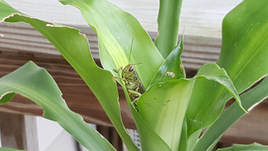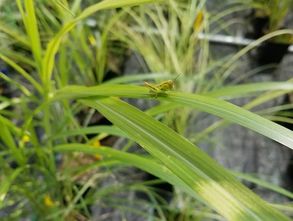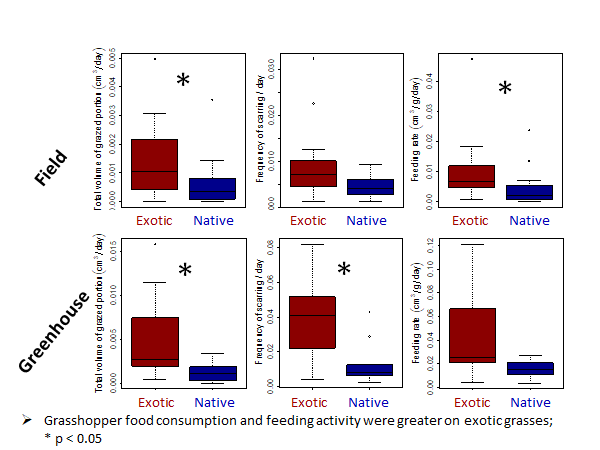 Photo credit: Sergey Photo credit: Sergey Written by: Dylan Kutz & Serhat Solmaz Our ecosystems are under siege by plants hailing from exotic realms. Can one of nature’s most ubiquitous insects be the key to saving protecting our native locales from invasion?  Figure 1: A Melanopus sp. grasshopper, which are widely distributed across the United States. These grasshoppers feed on grasses, making them perfect for testing hypotheses involving nonnative and native grasses. Figure 1: A Melanopus sp. grasshopper, which are widely distributed across the United States. These grasshoppers feed on grasses, making them perfect for testing hypotheses involving nonnative and native grasses. When we hear someone talking about invasions and defending against them, one typically imagines warriors repelling a siege on their castle, or soldiers fighting to protect their home territory. But what if the invaders aren’t trying to take your castle or claim your land, but are leafy greens overrunning our ecosystems and drive out our native plants? Who defends our ecosystems against the noxious weeds that would tank their natural diversity? According to Dr. Alina Avanesyan, the knights of our croplands may very well be the most unlikely organisms: grasshoppers! Dr. Avanesyan has been studying grasshopper herbivory and feeding preferences since her Ph.D. years at the University of Cincinnati. Dr. Avanesyan studies novel associations between invasive plants and native herbivores, which simply means how these two organisms originally from different environments interact when put together in the same locale. The novel interactions Dr. Avanesyan studies are those between nonnative grasses and native grasshoppers. Through her research, she aims to see if a native grasshopper like those of the genus Melanopus contribute to an ecosystem’s biotic resistance by consuming nonnative grasses (such as the native Asian Miscanthus sp. Grasses)more frequently than their native counterparts (Figure 1). Biotic resistance is can be understood as an ecosystem’s ability to resist invasions by exotic organisms. The reasoning behind Dr. Avanesyan’s research is one that ecologists have pondered before. Exotic plants don’t share an evolutionary history with most organisms in an introduced locale, so they may not have the defenses necessary to avoid becoming the new favorite snack of native herbivores like grasshoppers. And this is exactly what Dr. Avanesyan observed when she gave native grasshoppers choices between nonnative and native grasses to feast upon.  Figure 2: Grasshopper herbivory choice results from Avanesyan and Culley 2015. Native grasshoppers fed more frequently and consumed more nonnative grasses than native grasses when given the choice. Figure 2: Grasshopper herbivory choice results from Avanesyan and Culley 2015. Native grasshoppers fed more frequently and consumed more nonnative grasses than native grasses when given the choice. The native grasshoppers heavily preferred the exotic grasses over the native grasses in field and greenhouse settings (Figure 2). These findings help solidify their place as an important component of biotic resistance in the ecosystems they inhabit. To see whether these findings are applicable exclusively for the grasshopper species she used on her research or not, Dr. Avanesyan made a systematic review and meta-analysis of all the studies published during the last fifty years on grasshopper preferences on native and exotic plants. She screened the studies with direct feeding trials of the native and exotic plants with definite results that could be used for data analysis. Out of all the studies she reviewed, only 13 of them met her main criteria. She found out most of the preferred plants were exotic plants. Furthermore, most of the preferred plants were plants with high or middle invasive ranks. As a result of this review, we see the evidence that grasshoppers have a high potential to contribute to the biotic resistance in their habitat by preferring to feed on the introduced invasive plants over the native plants. These findings have propelled Dr. Avanesyan to question whether all grasshoppers contribute to ecosystem integrity in the same way she has observed. If so, grasshoppers may just be the hidden defenders of our ecosystems that are just now receiving praise for their hard work! About the Authors: Dylan Kutz is a Msc student in the Lamp Lab at the University of Maryland, where he is studying natural enemy habitats in agroecosystems. He is currently working on a project assessing the value of agricultural drainage ditches as refugia for the spiders of agroecosystems. Serhat Solmaz is a MS student in the vanEngelsdorp Lab at the University of Maryland. Literature Cited: Avanesyan, A., & Culley, T. M. (2015). Herbivory of native and exotic North-American prairie grasses by nymph Melanoplus grasshoppers. Plant ecology, 216(3), 451-464. All photos provided by Dr. Avanesyan Comments are closed.
|
Categories
All
Archives
June 2024
|
Department of Entomology
University of Maryland
4112 Plant Sciences Building
College Park, MD 20742-4454
USA
Telephone: 301.405.3911
Fax: 301.314.9290
University of Maryland
4112 Plant Sciences Building
College Park, MD 20742-4454
USA
Telephone: 301.405.3911
Fax: 301.314.9290

 RSS Feed
RSS Feed




